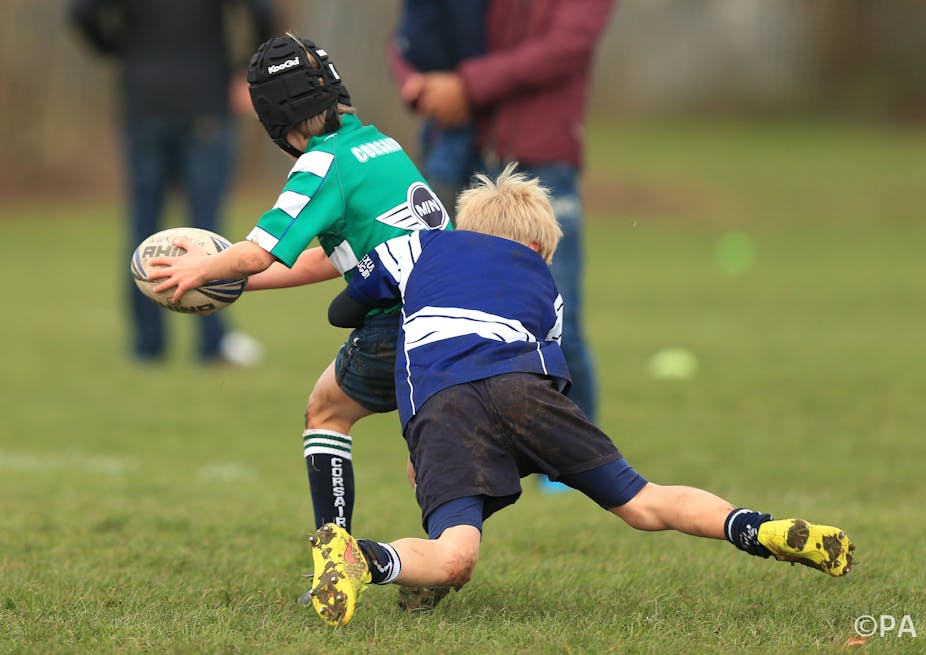The call by more than 70 academics and doctors for a ban on tackling in school rugby provoked inevitable debate.
As a lecturer in sports ethics, my curriculum for more than 15 years has focused on constructing careful and measured arguments to defend a particular position. In many arguments about the dangers of sport, the conversation tends to stop after evidence of injury proves a point one way or the other; there is little discussion as to what values will be lost in the rush to prevent any harm.
Risk and harm are an inevitable part of children’s lives, so why should some risks and harms be more morally important than the value that is brought by the activity or action?
Though tackling can be a brutal move, the physical nature of rugby and its rough state of play is often deemed to be character-building, helping children learn through team sports and physical tactics.
Injury intervention
If we decide that the concerns over potential harm in rugby are morally important – outweighing any potential benefit that the sport brings – and that we should do something about them, we then need to decide what form intervention should take. In the case of children playing rugby, this might include rule changes, education, prohibition and introducing safety equipment.
However, there is still more to weigh up. For example, the strategy used to control doping in sport, which requires players to undergo testing to determine if they have used banned substances and issuing a ban if they are found to have done so, raises a significant number of concerns about the privacy, surveillance and autonomy of players – but we decide that fairness is more important.
Likewise, the introduction of compulsory helmets for children in cricket makes the sport more expensive and potentially more exclusive. Each stage of the argument is complex and no amount of empirical data will settle any issue.
Even if medics and academics are able to provide evidence showing that there is risk of injury which might be severe and have long-term consequences, their stance on the issue means they are making a value judgement or taking a moral stance. They are advocating paternalism and/or prudence. Paternalism – or parentalism – involves making a decision on behalf of children in order to prevent harm, in the case of school rugby, by prohibiting tackling.
The principle is fairly uncontroversial –- we do this all the time. The issue isn’t that we shouldn’t look out for children’s well-being, but whether prohibiting tackling will deliver overall benefit. While it might reduce the risk of injury, supporters can argue that if we follow the advice of those academics and medics who signed the open letter to politicians, some important values such as building character will be lost.
It is far more difficult to offer evidence for the character-building potential of rugby than it is to prove harm, not least because we are not sure what character is or how indeed it’s built. This is not to dismiss the claim that rugby and tackling does build character, but to acknowledge that substantiating it is far more difficult than substantiating the claim that injuries occur in rugby.
Even if we could demonstrate clearly that rugby (tackling included) builds character in ways that rugby (non-tackling) doesn’t –- or for that matter in ways that no other less risky activity could –- we would still need to make the case that character building’s positive outcomes outweigh the negative harm and risk.
Given these are two very different elements –- physical harms versus social or psychological benefits – one might say that it’s like comparing apples with pears.
Forward-thinking
When it comes to prudence, in some respects the prudent thing to do is just as difficult to identify. Prudence requires us to think about how our actions today might impact our future. The prudent thing to do is not to close down one’s future options by our present actions.
Rugby with tackling might limit our children’s options in the future, because paralysis or cognitive dysfunction is a significant threat to well-being. On the other hand not giving our children the opportunity to challenge themselves, develop important character traits or experience the value of rugby (tackling included) might in itself compromise their future well-being.
As statistics won’t settle the issue, a prudent approach means that we must weigh up the evidence before us, then carefully and rationally come to a cautious decision.
In this particular case, I’m not sure that rugby with tackling builds character in ways that rugby (non-tackling) or other sports can’t. I am fairly sure, however – and despite suffering two collarbone breaks before the age of 15 in rugby – that playing sports like rugby are rewarding, enjoyable and challenging.
Whether the risks are worth it, I’m not sure; will I encourage my son to play rugby? Again I’m not sure. If he doesn’t then I don’t think his life will be impoverished, but neither will it be free of risk.

